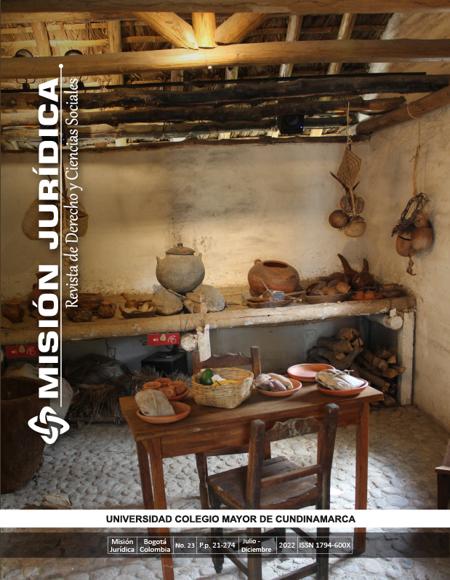The mexican senate in the treaty process approval : constitutional comparison with the United States of America`s model
El senado mexicano en el proceso de aprobación de los tratados : comparación constitucional con el modelo de los Estados Unidos de América
COPYRIGHT PROVISIONS
Every papper included in the magazine can be reproduced whole or in part, provided that respect for its original content, the source is acknowledged and is used with non-commercial academic. Legal mission and its content is protected under a license Creative Commons Attribution-Noncommercial-

Misión Jurídica is distributed under a Creative Commons Attribution-NonCommercial-NoDerivar 4.0 International License.
Based on a work in http://unicolmayor.edu.co/publicaciones/index.php/mjuridica/index.
Permits that go beyond what is covered by this license can be found at http://unicolmayor.edu.co/publicaciones/index.php/mjuridica/index.
Show authors biography
The main objective of this research is to analyze article 76 section I of the Political Constitution of the United Mexican States regarding the Senate’s obligation to approve international treaties previously negotiated by the President of Mexico in the terms set by Article 89, Section X, of the same Constitution. Therefore, the Executive branch has the exclusive faculty to define the text of the treaty without the intervention of the Senate or any other legislative body. Consequently, the scope of this research is to consider wether the Mexican Senate can advise the president in the definition of the text of the treaty as it is done by the United States Senate in accordance with its constitutional norm. Thus, using the comparative constitutional law method, a proposal to reform Article 76, Section I of the Mexican Constitution is presented.
Article visits 118 | PDF visits 114
Downloads
- Auerswald, D. & Maltzman, F. (2003). Policymaking through advice and consent: Treaty consideration by the United States Senate. The Journal of Politics, 65(4), pp. 1097-1110.
- Beach, JR., E. C. (2021). The good of each of the parts”: A collective action understanding of the treaty clause. Duke Journal of Constitutional Law and Public Policy, vol. 16, pp. 279-304.
- Cámara de Diputados. Constitución de los Estados Unidos Mexicanos. https://www.diputados.gob.mx/LeyesBiblio/pdf/CPEUM.pdf.
- Cámara de Diputados. Ley Sobre Celebración de Tratados. https://www.diputados.gob.mx/LeyesBiblio/pdf/216_200521.pdf.
- Organización de los Estados Americanos (OAS). Convención de Viena sobre el Derecho de los Tratados. https://www.oas.org/xxxivga/spanish/reference_docs/convencion_viena.pdf.
- Corwin, E. S. (1917). The president’s control of foreign relations. Princeton University Press.
- Corte Internacional de Justicia (s. f.). Estatuto de la Corte Internacional de Justicia. https://www.icj-cij.org/public/files/statute-of-the-court/statute-of-the-court-es.pdf.
- Eichensehr, K. E. (2013). Treaty termination and the separation of powers. Virginia Journal of International Law, vol. 53, pp. 247-308.
- Fischer, L. (2008). The law treaty negotiation: A presidential monopoly? Presidential Studies Quarterly 38, no. 1, pp. 144-158.
- García P., M. (1984). “Uniones de Estados y Estado Federal”. En Derecho Constitucional Comparado, pp. 205-246. Editorial Alianza.
- Gonzáles T., M. (2008). La Fragmentación del Control de Constitucionalidad: el Principio de Autonomía y los Modelos Periféricos. De Jure, Num. III-1, pp. 99-107.
- Hamilton, A. (1788). The treaty making power of the executive. The Federalist Papers No. 75. https://guides.loc.gov/federalist-papers/full-text#TheFederalistPapers-75.
- Halperin, J-L. (2011). Law in Books and Law in Action: The Problem of Legal Change. Maine Law Review, 64(1), pp. 45-76.
- Kelsen, H. (1982). Teoría Pura del Derecho. IIJ-UNAM.
- Klug, H. (2015). Constitutionalism, Comparative. International Encyclopedia of the Social & Behavioral Sciences, Volume 4, pp. 704-709. http://dx.doi.org/10.1016/B978-0-08-097086-8.86013-4.
- López G., L. (1999). Introducción al Derecho Constitucional. Editorial Tirant Lo Blanch.
- Madison, J. (1788). The conformity of the Plan to Republican Principles. The Federalist Papers No. 39. https://guides.loc.gov/federalist-papers/text-31-40.
- Merriam-Webster Legal Dictionary. https://www.merriam-webster.com/dictionary/consent#legalDictionary.
- Real Academia de la Lengua Española (RAE). Diccionario. www.dle.rae.es.
- Rivera S., J. F., y Rivera S., M. (2014). La conformación del Senado mexicano en el siglo XXI: Análisis socio jurídico de la fórmula para asignar los escaños (La reforma política pendiente). Alegatos, núm. 86, pp. 125-154.
- Ruipérez A., J. (1994). La Protección Constitucional de la Autonomía Política. Editorial Tecnos.
- Seara V., M. (2009). Derecho Internacional Público. Porrúa.
- Sepúlveda, C. (2009). Derecho Internacional. Porrúa.
- Setear, J., K. (2002). The President´s rational choice of a treaty´s preratification pathway: Article II, congressional-executive agreement or executive agreement? Journal of Legal Studies, vol. XXXI, pp. S5-S39.
- Tornos M., J. (2013). Atribuciones y Autonomías en Estados Federales y Estados Unitarios. En Descentralización, transparencia y seguridad jurídica en América Latina y Europa, pp.: 101 - 132. Instituto Nacional de Administración Pública.
- Tushnet, M. (2014). Advanced Introduction to Comparative Constitutional Law. Edward Elgar Publishing Limited.
- United States of America Senate. Constitution of the United States of America, https://www.senate.gov/civics/constitution_item/constitution.htm.
- United States of America Senate. https://www.senate.gov/artandhistory/history/common/generic/Origins_AdviceConsent.html.
- Unification and Certainty: The United Nations Convention on Contracts for the International Sale of Goods. (1984). Harvard Law Review, 97(8), 1984–2000. https://doi.org/10.2307/1340938.
- Vírgala F., E. (2011). Las relaciones de inordinación en el estado autonómico español. Revista de Estudios Políticos, Num. 151, pp. 109-152.
- Yoo, J. C. (2001). Laws as treaties? The constitutionality of congressional-executive agreements. Michigan Law Review, vol. 99, num. 4, pp. 757-852.
- Zucca, L. (2009). Montesquieu, Methodological Pluralism and Comparative Constitutional Law. European Constitutional Law Review, No. 5, pp. 481-500.
















